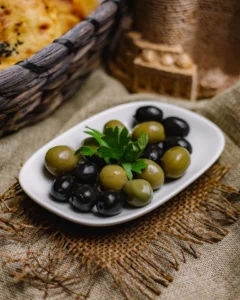What we do
THE BEST
OLIVES IN THE WORLD
Quality and taste without borders
Explore the best of the world in our selection of renowned global brands. Enjoy unique flavours, cultivated with dedication and the highest quality, through our olives and brands.
Olives
Discover our varieties of olives Hojiblanca (balanced and crunchy), Gordal (large and fleshy) and Manzanilla (sweet and aromatic).
BRANDS
We offer a wide variety, giving you the possibility to work with your own personalised brand, reflecting distinction and excellence in each product.
What we do
THE BEST
OLIVES IN THE WORLD
Quality and taste without borders
Explore the best of the world in our selection of renowned global brands. Enjoy unique flavours, cultivated with dedication and the highest quality, through our olives and brands.
Olives
Discover our varieties of olives Hojiblanca (balanced and crunchy), Gordal (large and fleshy) and Manzanilla (sweet and aromatic).
BRANDS
We offer a wide variety, giving you the possibility to work with your own personalised brand, reflecting distinction and excellence in each product.
channels
CONNECTING
THE WORLD WITH OUR OLIVES
Efficiency and global reach through our specialised distribution channels.
Each channel requires specific formats and tailored strategies to meet the particular requirements of the markets and satisfy our customers’ needs.
01
CATERING
Formats:
· Can: A20, A15, A10 and A8
· Glass: 1 gallon, ½ gallon, ¼ gallon
· Pouch: ALU 83 oz, ALU 33 oz
02
RETAIL
· Can: 12 oz superlong, 12 oz, 10 oz, A212
· Glass: V720, 20 PAR, 16 PAR, 12 PAR, A370, 8 PAR
03
INDUSTRY
04
MULTI-CHANNEL
TRACEABILITY GUARANTEE
WE DELIVER THE BEST OLIVES
FROM THE LAND TO YOUR HOME
No borders
From the origin of the olives in the olive grove to your table, every step is transparent and carefully documented. We ensure the quality and freshness of our products, complying with the highest standards of food safety.
02
Factory
Located in the Polígono Industrial Norte de Aguilar de la Frontera, in the province of Cordoba, Spain, our factory is a complex of 100,000 square metres, which is divided into a storage and seasoning area, packaging, sorting, oxidation, boning, warehouses and laboratory, as well as a purifier and a processing plant. The organisation also has offices in Aguilar de la Frontera and in the city of Cordoba, where its headquarters are located.
04
Logistics and Transport
In order to lead the logistics process, key factors such as knowledge of languages, the necessary certifications and the updating of current legislation are implemented.
Incoterms used in Torrent: CFR, CIF and EXWORKS.
What is the day-to-day work in Torrent like?
Forecast of destinations (20’ or 40’ container), request for quotation and ship dates, load scheduling, booking request and confirmation from the shipping company, preparation of delivery note and invoice, documentation is sent to the dispatcher, documentation is prepared and sent to the client, and the company is able to send the documentation to the client

01
Olive plantation
Aceitunas Torrent has more than 200 hectares of its own olive groves in the irrigable area Genil-Cabra, a privileged enclave in the heart of the Cordoba countryside, the birthplace of the Hojiblanca olive.
03
Marketing
Aceitunas Torrent works with the main varieties of Andalusian olives such as Hojiblanca, Gordal and Manzanilla. The Hojiblanca variety from Cordoba is the most widely used and most in demand internationally. In addition, we offer a wide diversity in terms of presentation and consumption of table olives (whole, pitted, sliced and stuffed), providing high quality, healthy and tasty products.
01
Olive plantation
Aceitunas Torrent has more than 200 hectares of its own olive groves in the irrigable area Genil-Cabra, a privileged enclave in the heart of the Cordoba countryside, the birthplace of the Hojiblanca olive.
02
Factory
Located in the Polígono Industrial Norte de Aguilar de la Frontera, in the province of Cordoba, Spain, our factory is a complex of 100,000 square metres, which is divided into a storage and seasoning area, packaging, sorting, oxidation, boning, warehouses and laboratory, as well as a purifier and a processing plant. The organisation also has offices in Aguilar de la Frontera and in the city of Cordoba, where its headquarters are located.
03
Marketing
Aceitunas Torrent works with the main varieties of Andalusian olives such as Hojiblanca, Gordal and Manzanilla. The Hojiblanca variety from Cordoba is the most widely used and most in demand internationally. In addition, we offer a wide diversity in terms of presentation and consumption of table olives (whole, pitted, sliced and stuffed), providing high quality, healthy and tasty products.
04
Logistics and Transport
In order to lead the logistics process, key factors such as knowledge of languages, the necessary certification and the updating of current legislation are implemented.
Incoterms used in Torrent:
CFR, CIF and EXWORKS.
What is the day-to-day work in Torrent like?
Forecast of destinations (20’ or 40’ container), request for quotation and shipping dates, load scheduling, booking request and confirmation from the shipping company, preparation of delivery note and invoice, documentation is sent to the dispatcher, documentation is prepared and sent to the client.
Certification
We have ISO 9001, ISO 14001, IFS Food, Halal, Kosher and BRCGS certifications,
ensuring the quality and safety of our olives according to international standards.


NEWS
DISCOVER
THE WORLD OF OLIVES
Explore the flavours, benefits and unique characteristics of our olives and olive oils, as well as recipes.

Green and black olives, how different are they?
Whatever type they are – green, black, stuffed, pitted… – olives are the flagship of the aperitif in our country.


